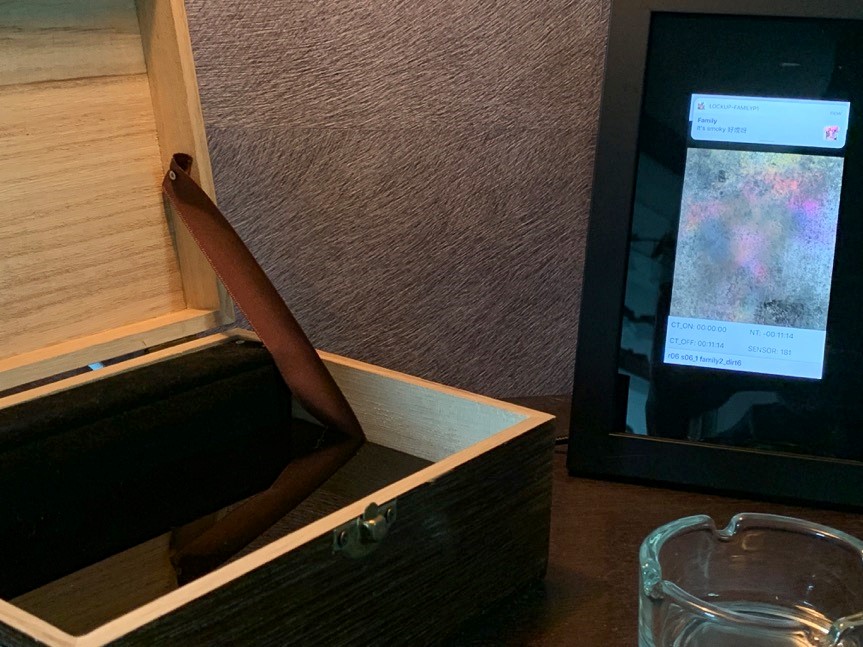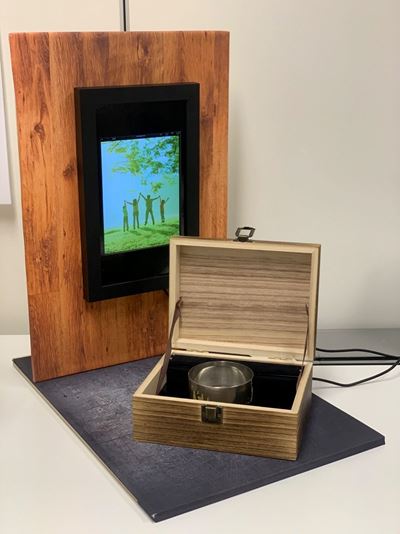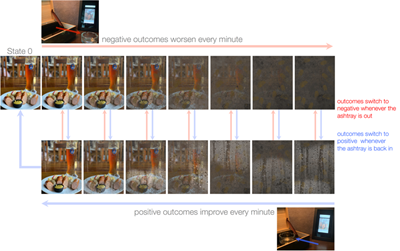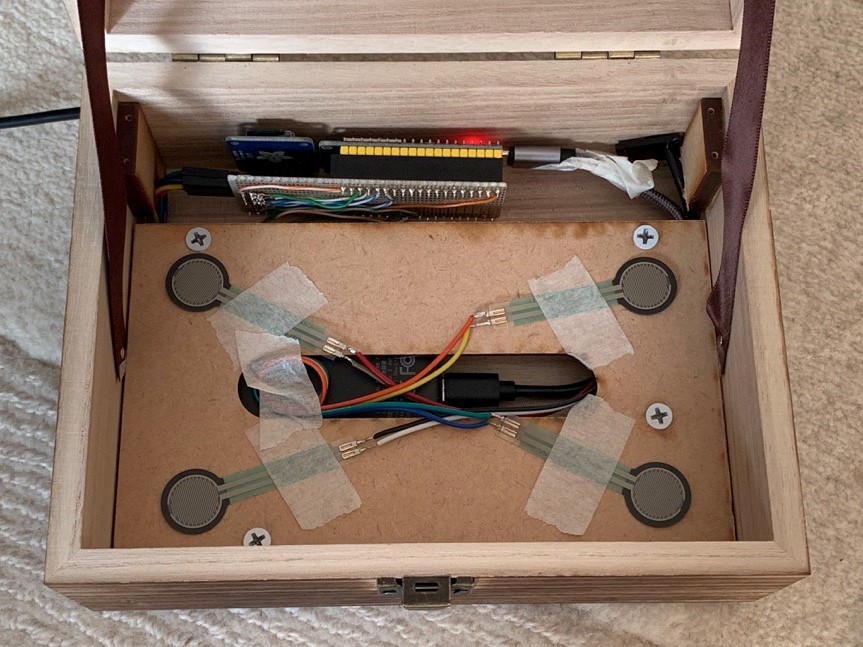Interaction Design Lab is an applied research and consultancy facility at the School of Design. Established in April 2004, the Lab is endowed with the mission to promote the viability of interaction design in design and in Hong Kong industries at large.
Its aim is to develop new knowledge in interaction design and to explore new interaction design paradigms that help in designing more pleasurable and meaningful user experience. The emphasis is on user-centred design research, but the lab’s methods are solidly constructive, ending up in functioning demonstrations.
Location: V611-V614, 6/F, JCIT
Crafting Animated Parables to Track Smoking

Incingarette is an Internet-of-Things (IoT) system that assists people in smoking reduction. It consists of a smart ashtray with a digital picture frame. When a person smokes, the digital picture starts to be gradually covered with dirt. The design draws on psychology research insights that frequently imagining an event renders it seemingly more likely. With always-on sensing technologies, virtual feedback can be designed to provide frequent experiences that tie the real-life behavior with imaginary outcomes, which can affect one’s behavioral intention. Field trials of the working prototype demonstrate incremental change in intention to reduce smoking.

Figure 1. A working prototype of Incingarette simulating the digital picture frame mounted on the wall in a smoking cabin.

Figure 2. The design of Incingarette blends the concepts of smoking and incinerating. The use of the ashtray causes the digital picture to be covered by dirt. When the ashtray is not used, the dirt is gradually washed away.

Figure 3. The use of the ashtray is detected by weight sensors, and the data is processed by the microcontroller, which communicates to the cloud server that renders the digital picture.

Figure 4. A field trial of the working prototype with a participant.
Effects on Closeness, Empathy, and Game Immersion
This project investigated the effect of experiencing the perspective of a non-player character (NPC) in prosocial virtual reality (VR) games. In prosocial VR games, players usually take the role of a heroic player character and help other NPCs such as victims attacked by villains. This project examined if the players can experience the perspective of a victim NPC before a gameplay would influence their gameplay experiences. With a VR game made with Unity, the team conducted a lab-based study. The result shows that the perspective-taking of a NPC indirectly enhances light gamers’ level of immersion into a prosocial VR game, through its effect on perceived closeness to and empathy to the NPC. But the effect was not found among the heavy gamers. More details can be found in the paper published in Behaviour & Information Technology:
Ho, J. C. F., & Ng, R. (2020). Perspective-Taking of Non-Player Characters in Prosocial Virtual Reality Games: Effects on Closeness, Empathy, and Game Immersion. Behaviour & Information Technology. https://doi.org/10.1080/0144929X.2020.1864018 (Online First)
Before a gameplay, players experience what it is like to be a victim – a robot being destroyed (Left and middle). In the gameplay, the players need to use water guns to protect the remaining robots from fire (Right).
Team Members
Jeffrey C. F. Ho, Project leader
Ryan Ng, Team member
This is a default paragraph for your editing
 At vero eos et accusamus et iusto odio dignissimos ducimus qui blanditiis praesentium voluptatum deleniti atque corrupti quos dolores et quas molestias excepturi sint occaecati cupiditate non provident, similique sunt in culpa qui officia deserunt mollitia animi, id est laborum et dolorum fuga. Et harum quidem rerum facilis est et expedita distinctio. Nam libero tempore, cum soluta nobis est eligendi optio cumque nihil impedit quo minus id quod maxime placeat facere possimus, omnis voluptas assumenda est, omnis dolor repellendus. Temporibus autem quibusdam et aut officiis debitis aut rerum necessitatibus saepe eveniet ut et voluptates repudiandae sint et molestiae non recusandae. Itaque earum rerum hic tenetur a sapiente delectus, ut aut reiciendis voluptatibus maiores alias consequatur aut perferendis doloribus asperiores repellat.
At vero eos et accusamus et iusto odio dignissimos ducimus qui blanditiis praesentium voluptatum deleniti atque corrupti quos dolores et quas molestias excepturi sint occaecati cupiditate non provident, similique sunt in culpa qui officia deserunt mollitia animi, id est laborum et dolorum fuga. Et harum quidem rerum facilis est et expedita distinctio. Nam libero tempore, cum soluta nobis est eligendi optio cumque nihil impedit quo minus id quod maxime placeat facere possimus, omnis voluptas assumenda est, omnis dolor repellendus. Temporibus autem quibusdam et aut officiis debitis aut rerum necessitatibus saepe eveniet ut et voluptates repudiandae sint et molestiae non recusandae. Itaque earum rerum hic tenetur a sapiente delectus, ut aut reiciendis voluptatibus maiores alias consequatur aut perferendis doloribus asperiores repellat.



